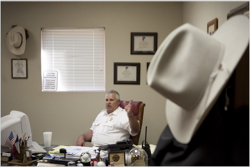As Republicans pound their chests trumpeting the success of the 84th legislative session, many of us are left wondering which was the lousiest bill passed. Open carry? Guns on campus? “Repatriating” Texas gold bullion from Fort Knox to a depository in Texas — huh? Let’s not forget failing to pass a ban on texting while driving.
My pick for worst bill passed was the one removing corruption prosecution of public officials and state employees from the Travis County Public Integrity Unit to the home counties of those being investigated, with the Texas Rangers doing the official’s initial investigation. All of us know that good-ol’-boy clubs are as emblematic of Texas as cowboys and oil wells; doesn’t the Legislature?
You have to look no further than the Winkler County whistleblower imbroglio to see how local prosecutions can go bad and why this law stinks. But you have to look pretty far west; it’s located in the dusty Permian Basin practically on the border with New Mexico.
Here’s how the story goes: Kermit (population 5,000) desperately needed a doctor. An affable Rolando Arafiles rode into town. The town’s prominent good ol’ boys all liked the smiling doctor. So, despite having a stipulation on his medical license for corruption in Corpus Christi, the hospital hired him in 2007.
By the following year, a doctor, a nurse practitioner and two quality assurance nurses employed by Winkler County Memorial Hospital, separately reported Arafiles to the Texas Medical Board for substandard care. After the medical board sent Arafiles the reports with names redacted, he complained of harassment to his golfing buddy, the sheriff.
Through nefarious means, the sheriff found the nurses’ report to the board on one of the nurse’s computers. The hospital administrator immediately fired the nurses, and the county attorney charged the nurses with misuse of official information, a third-degree felony punishable by up to a $10,000 fine and 10 years in prison.
No nurse ever had been criminally prosecuted for reporting a doctor, and national headlines were made. One of the nurses chose to retire early, and charges against her were dropped. But the case against the other nurse, Anne Mitchell, went to trial. After four days of a trial attended by nurses from across the state and a reporter and photographer from the New York Times, Mitchell was acquitted in less that an hour.
Smelling rot, in an anomalous 180-degree judicial turnaround the attorney general’s office investigated and charged all members of the good-ol’-boys club — the doctor, sheriff, hospital administrator and county attorney — with two counts each of two felonies: retaliation and misuse of official information.
All were found guilty, resigned their positions, were fined and served time behind bars. The doctor, sheriff and county attorney all lost their professional licenses. Justice was served, but not for the two nurses whose brilliant careers were ended for exercising their ethical duty to protect the public. And not for Kermit, the previously peaceful town that was, and remains, torn apart.

Judge David Glicler (former assistant attorney general) brought justice to the corrupt local officials.
David Glickler, a Hays County judge and former assistant attorney general who so brilliantly prosecuted the case against the local officials, told me he believes the Winkler County case was a prosecutorial aberration. But Sen. Kirk Watson (D-Austin) believes the bill in effect leaves “legislators proclaiming themselves and statewide elected officials as a privileged class with benefits their constituents don’t have.” Amen.
It took a statewide prosecution to right the wrongs of a local prosecution. Gov. Greg Abbott has refused comment on the bill, but we’ll know within a week if he allows it to become law without his signature. As former attorney general, he above anyone should know that this bill doesn’t pass the sniff test and that corruption cases of state officials should be prosecuted by a statewide entity, like say, the attorney general’s office. The Texas Rangers already investigate most of their cases anyway.
It’s only because the nurses’ case received national media attention that the local villains came to justice. It’s hard to shine the light of day on all 254 Texas counties in this huge state with vast rural and frontier areas — and lots of small good-ol’-boy clubs made up of the counties’ prominent citizens who have personal and business relationships with each other.



 Austin, Texas
Austin, Texas